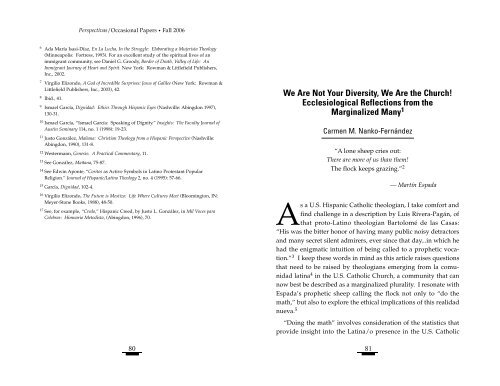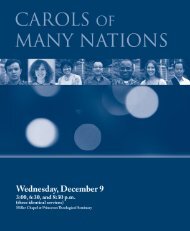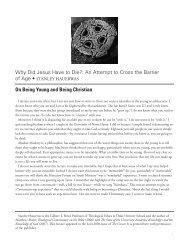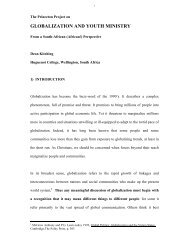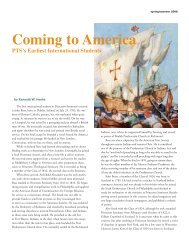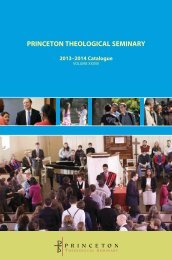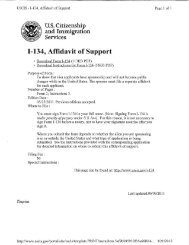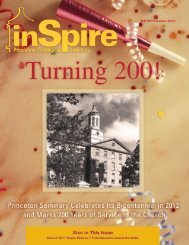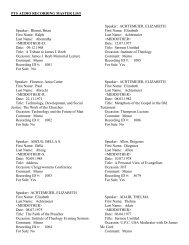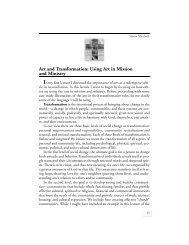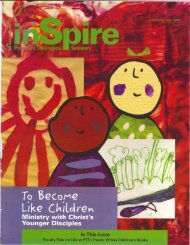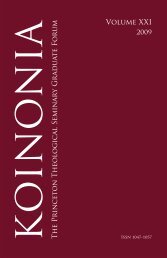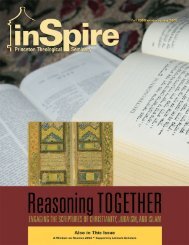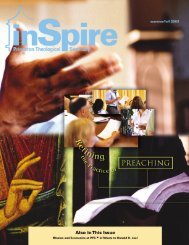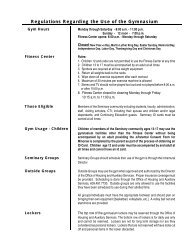P E R S P E C T I VAS - Princeton Theological Seminary
P E R S P E C T I VAS - Princeton Theological Seminary
P E R S P E C T I VAS - Princeton Theological Seminary
Create successful ePaper yourself
Turn your PDF publications into a flip-book with our unique Google optimized e-Paper software.
Perspectivas/Occasional Papers • Fall 20066 Ada María Isasi-Díaz, En La Lucha, In the Struggle: Elaborating a Mujerista Theology(Minneapolis: Fortress, 1993). For an excellent study of the spiritual lives of animmigrant community, see Daniel G. Groody, Border of Death, Valley of Life: AnImmigrant Journey of Heart and Spirit. New York: Rowman & Littlefield Publishers,Inc., 2002.7 Virgilio Elizondo, A God of Incredible Surprises: Jesus of Galilee (New York: Rowman &Littlefield Publishers, Inc., 2003), 42.8 Ibid., 41.9 Ismael García, Dignidad: Ethics Through Hispanic Eyes (Nashville: Abingdon 1997),130-31.10 Ismael García, “Ismael García: Speaking of Dignity.” Insights: The Faculty Journal ofAustin <strong>Seminary</strong> 114, no. 1 (1998): 19-23.11 Justo González, Mañana: Christian Theology from a Hispanic Perspective (Nashville:Abingdon, 1990), 131-8.12 Westermann, Genesis: A Practical Commentary, 11.13 See González, Mañana, 75-87.14 See Edwin Aponte, “Coritos as Active Symbols in Latino Protestant PopularReligion.” Journal of Hispanic/Latino Theology 2, no. 4 (1995): 57-66.15 García, Dignidad, 102-4.16 Virgilio Elizondo, The Future is Mestizo: Life Where Cultures Meet (Bloomington, IN:Meyer-Stone Books, 1988), 48-50.17 See, for example, “Credo,” Hispanic Creed, by Justo L. González, in Mil Voces paraCelebrar: Himnario Metodista, (Abingdon, 1996), 70.80We Are Not Your Diversity, We Are the Church!Ecclesiological Reflections from theMarginalized Many 1Carmen M. Nanko-Fernández“A lone sheep cries out:There are more of us than them!The flock keeps grazing.” 2— Martín EspadaAs a U.S. Hispanic Catholic theologian, I take comfort andfind challenge in a description by Luis Rivera-Pagán, ofthat proto-Latino theologian Bartolomé de las Casas:“His was the bitter honor of having many public noisy detractorsand many secret silent admirers, ever since that day...in which hehad the enigmatic intuition of being called to a prophetic vocation.”3 I keep these words in mind as this article raises questionsthat need to be raised by theologians emerging from la comunidadlatina 4 in the U.S. Catholic Church, a community that cannow best be described as a marginalized plurality. I resonate withEspada’s prophetic sheep calling the flock not only to “do themath,” but also to explore the ethical implications of this realidadnueva. 5“Doing the math” involves consideration of the statistics thatprovide insight into the Latina/o presence in the U.S. Catholic81


